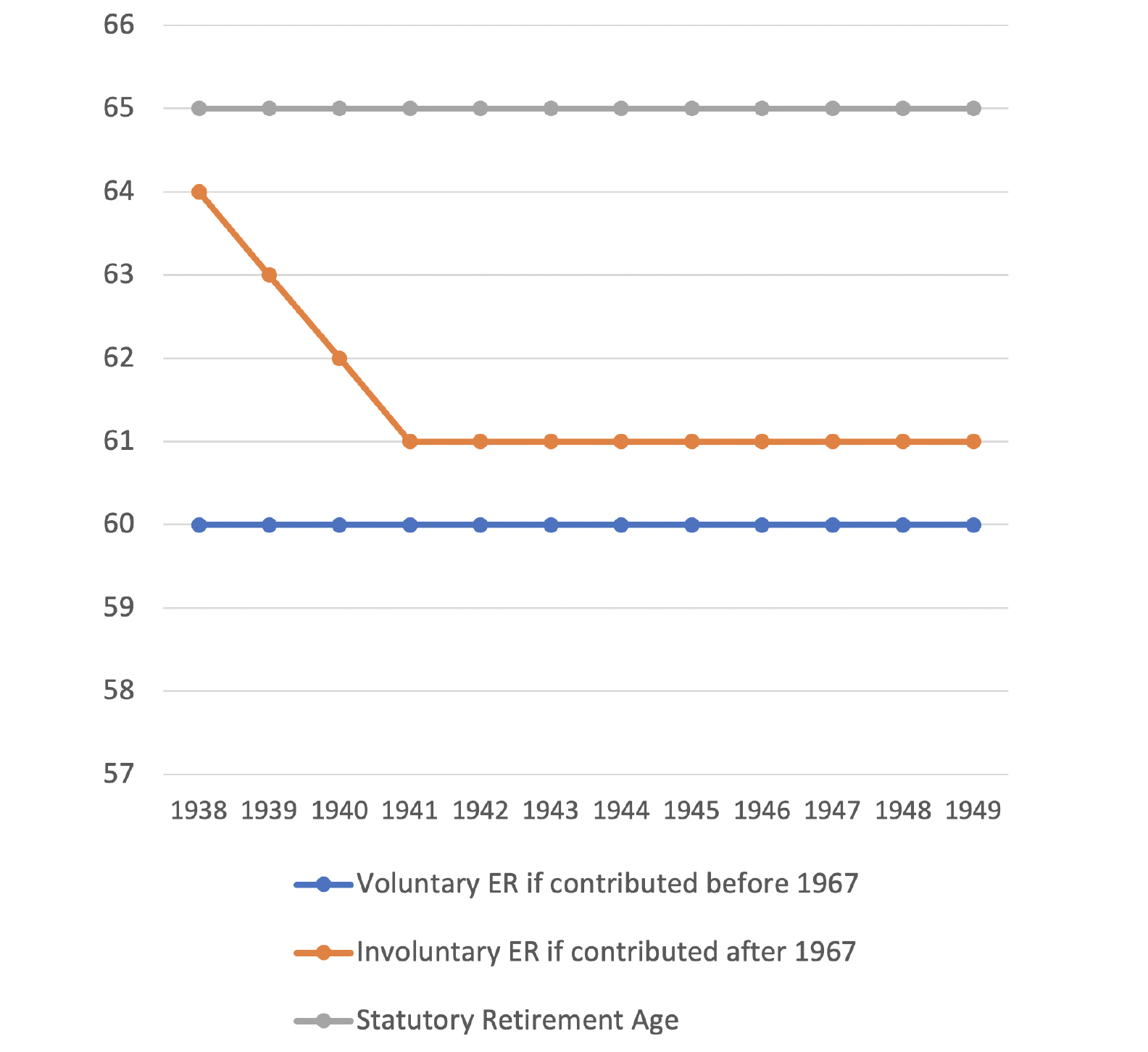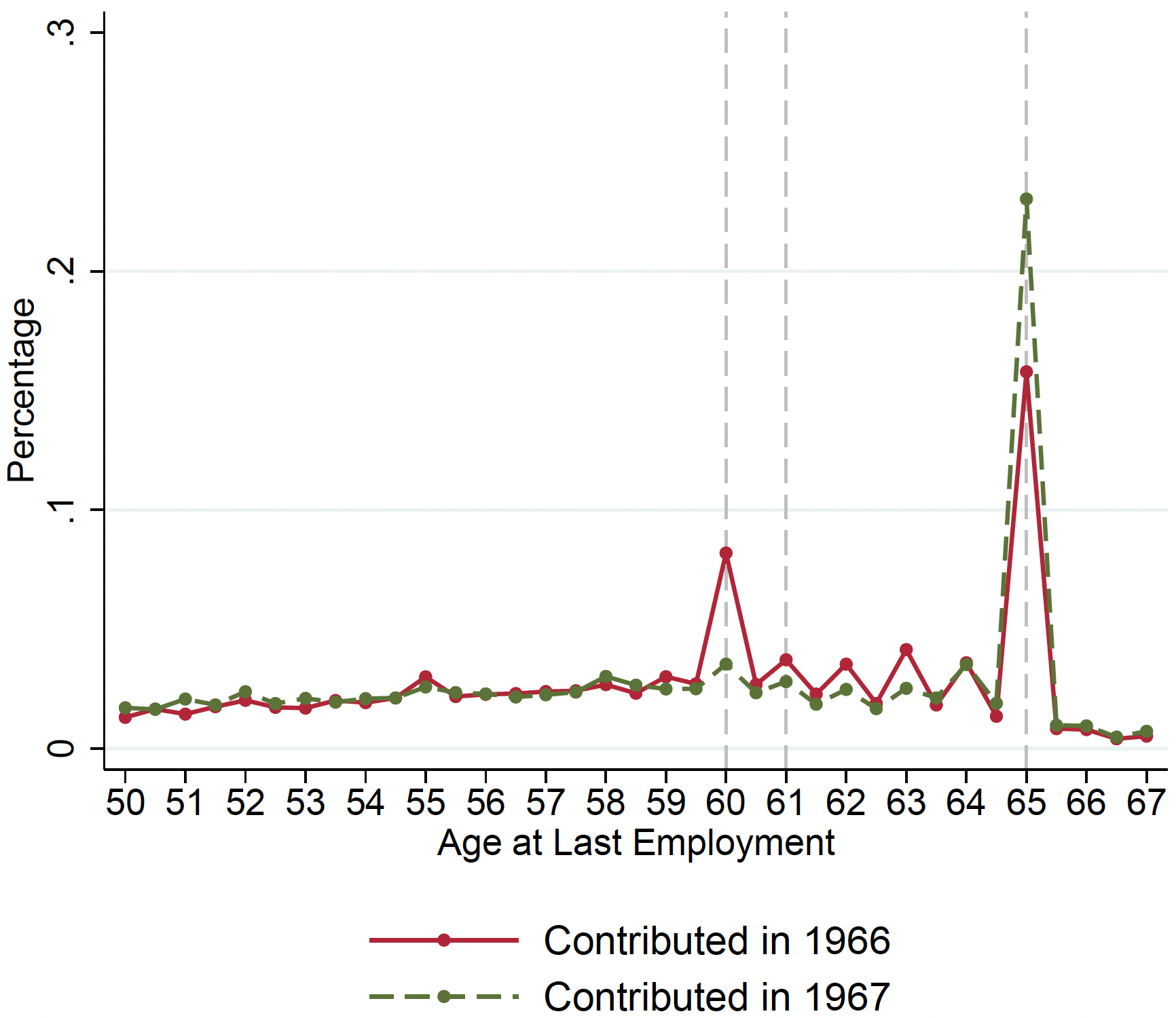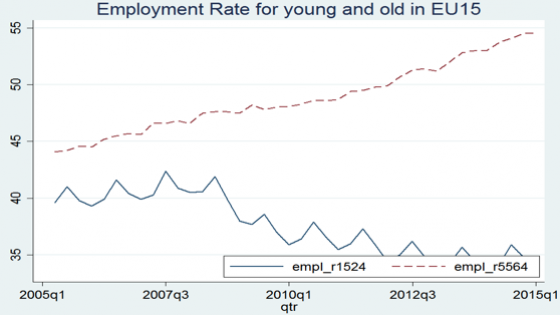Many countries have reformed their public pension systems to cope with aging populations and maintain financial solvency. One of the main policy tools is restricting access to early retirement schemes. The existing literature has studied how increasing the retirement age affects youth employment, firm outcomes, and productivity, among other labour outcomes (e.g. Boeri et al. 2016, Carta et al. 2021, Ash 2021, Kolsrud et al. 2022).
The impact of retirement on health is theoretically and empirically ambiguous. Earlier retirement can positively impact health via more leisure, less work-related stress, better mental health, and adopting healthy lifestyles (Eibich 2015, Gorry et al. 2018). The effect of retirement on mental health and lifestyle habits are also analysed in the Vox columns by Picchio and van Ours (2020) and Motegi et al. (2015). On the other hand, earlier retirement can also harm health through the loss of social networks and the reduction of cognitive and physical activities (De Grip et al. 2012, Insler 2014, Celidoni and Rebba 2017).
Notably, very few papers study the mortality responses to delaying retirement. Previous empirical evidence mainly draws lessons from policy experiments that allow for earlier retirement (Coe and Lindeboom 2008, Hernaes et al. 2013, Hallberg et al. 2015, Bloemen et al. 2017, Kuhn et al. 2012, 2020). Because the effects on mortality from preponing and postponing the statutory retirement age are not necessarily symmetric, these estimates might not generalise to today’s policy world, where a common theme has been to induce workers to retire later (e.g. Gruber and Wise 1999, OECD 2021). Therefore, it is relevant to understand the impact of delaying retirement on mortality, particularly the effect of closing the early retirement options on mortality.
In a recent working paper (Bellés-Obrero et al. 2022), we address this question by exploiting a Spanish pension reform that took place in 1967.
Later exit of the labour market and use of alternative pension schemes
The 1967 Spanish pension reform exogenously changed the early retirement age depending on the date individuals started contributing to the Social Security system. Individuals who contributed to the pension system before 1 January 1967 could voluntarily claim a pension as early as age 60 (facing some penalties). On the other hand, individuals who started contributing after 1967 had to wait until the statutory retirement age at 65. They could involuntarily retire early at age 61 (they need to be unemployed for at least six months and have more than 30 years), but due to these stringent requirements, a negligible proportion of workers took up this involuntary early retirement option.
In Figure 1, we see the statutory retirement age and the earliest possible early retirement for individuals that contributed in 1966 and 1967 as a function of their birth year.
Figure 1 Retirement age by first year of contribution and cohort
Source: Authors’ own construction according to pension laws.
We use a novel version of the Spanish administrative Social Security panel data covering 10% of the cohort of individuals born between 1938 and 1949 who are registered with the Social Security system at any point in time until 2020.
To estimate the causal effects of this reform, we compare individuals born the same year but that have started contributing to Social Security one year apart: one year before 1 January 1967 versus one year after that date. We control for gender and individuals’ employment history between the ages 30 and 40. We further establish the causality of our estimates by using placebo cut-off dates, i.e. assigning the treatment status using dates other than 1 January 1967. We find no impact on labour supply and mortality using these placebo cut-offs.
Figure 2 shows the age distribution at last employment for individuals who started contributing in 1966 and 1967. As expected, we see a distinct difference. Around 8% of individuals who started contributing in 1966 leave the labour market at age 60, while this percentage is almost zero for those who began contributing in 1967. Our regression analysis confirms this pattern and finds that the reform delays the age at last employment by around half a year. The reform also changed the age of claiming a pension and the types of pensions claimed. We find a decrease in the probability of claiming a regular pension by 19%, an increase in the probability of claiming a partial pension by 54%, and an increase in the probability of claiming disability insurance by 19%. This indicates that individuals have utilised other ways to leave the labour market earlier when early retirement schemes are unavailable. We also show that they have a higher probability of not claiming any pension, driven mainly by premature mortality.
Figure 2 Density of age at last employment by treatment status
Source: MCLV, cohorts 1938-1949.
Notes: This figure plots the percentage of individuals by the age at which they finished their last employment. The solid red line shows the density for individuals who started contributing in 1966, while the green dashed line shows those who started contributing in 1967.
Delaying retirement increases mortality
To show the impact of delaying labour market exit on mortality, we instrument the age at last employment using the year individuals started contributing to the Social Security system. We examine the impact of age at last employment on the hazard of dying between different age brackets.
We find that delaying labour market exit by one year increases the hazard of dying between the ages of 60 to 69 by 4.2 percentage points (equivalent to a relative increase of 43%). When we look more closely, we find that the mortality responses are the strongest between ages 60 and 64, when individuals no longer have access to regular pensions. This result indicates that the negative effect of delaying retirement on mortality is driven mainly by the immediate effect of losing access to early retirement schemes.
Mechanisms
We explore several mechanisms to explain the detrimental effects of delaying retirement on health. First, we show that individuals’ workplace conditions before retirement are essential factors. We find that the increase in mortality is stronger for those who have worked in sectors with more workplace accidents. This finding is consistent with previous literature establishing that physically demanding occupations lead to adverse health effects. We also find that the mortality effect is stronger for individuals in high psychosocial burden jobs (with a high level of mental and social stress). Finally, we show that only individuals who work in low self-value industries (with a lower sense of achievement and recognition) are more likely to die when facing a one-year delay in the labour market exit. This result indicates that individuals who ‘feel recognised’ and have a sense of achievement in their work do not experience a negative mortality effect due to a delay in the labour market exit.
Second, we show that allowing workers to gradually reduce their working time towards the end of their careers and making partial retirement an option can incentivise workers to stay longer in the labour force without negatively affecting their health.
Policy implications
Our findings have important policy implications. First, we show a large heterogeneity in the effect of delayed retirement on mortality, depending on the characteristics of jobs that the individuals held before retirement. Going beyond distinguishing between blue- and white-collar jobs, we show that other job dimensions (such as physical, psycho-social, and self-value) also matter. This finding implies that policies that remove access to early retirement for the general population can exacerbate the socioeconomic disparities in life expectancy.
Second, we show the option of a gradual transition to retirement matters with regard to the impacts of retirement on mortality. Allowing older workers to gradually reduce their working time at the end of their careers can mitigate the adverse effects on mortality. Such mitigating effects can be made possible by promoting gradual retirement options. The results also speak to the recent public discussions on flexible retirement. This insight is also relevant for public policy and budgetary considerations, particularly when policymakers in many countries face long-term solvency challenges in both the pension and public healthcare systems.
References
Ash, E (2021), “What retirement policy in US state courts tells us about ageing and productivity in teams”, VoxEU.org, 3 July.
Bellés-Obrero, C, S Jiménez-Martín and H Ye (2022), “The Effect of Removing Early Retirement on Mortality”, IZA DP No. 15577.
Bloemen, H, S Hochguertel and J Zweerink (2017), “The causal effect of retirement on mortality: Evidence from targeted incentives to retire early”, Health Economics 26(12): e204–e218.
Boeri, T, P Garibaldi and E R Moen (2016), “Increases in the retirement age and labour demand for youth”, VoxEU.org, 8 September.
Carta, F, F D Amuri and T von Wachter (2021), “Workforce ageing, pension reforms, and firms’ outcomes”, VoxEU.org, 16 May.
Celidoni, M and V Rebba (2017), “Healthier lifestyles after retirement in Europe? Evidence from SHARE”, The European Journal of Health Economics 18(7): 805–830.
Coe, N and M Lindeboom (2008), “Does retirement kill you? Evidence from early retirement windows”, CentER Discussion Paper Series No. 2008-93.
Coe, N B, H-M von Gaudecker, M Lindeboom and J Maurer (2012), “The effect of retirement on cognitive functioning”, Health Economics 21(8): 913–927.
De Grip, A, M Lindeboom and R Montizaan (2012), “Shattered dreams: the effects of changing the pension system late in the game”, The Economic Journal 122(559): 1–25.
Eibich, P (2015), “Understanding the effect of retirement on health: Mechanisms and heterogeneity”, Journal of Health Economics 43: 1–12.
Gorry, A, D Gorry and S N Slavov (2018), “Does retirement improve health and life satisfaction?”, Health Economics 27(12): 2067–2086.
Gruber, J and D A Wise (1999), “Introduction to ‘Social Security and Retirement around the World’”, In J Gruber and D A Wise (eds.), Social Security and Retirement around the World, International Social Security, University of Chicago Press.
Hallberg, D, P Johansson and M Josephson (2015), “Is an early retirement offer good for your health? Quasi-experimental evidence from the army”, Journal of Health Economics 44: 274–285.
Hernaes, E, S Markussen, J Piggott and O L Vestad (2013), “Does retirement age impact mortality?”, Journal of Health Economics 32(3): 586–598.
Insler, M (2014), “The health consequences of retirement”, Journal of Human Resources 49(1): 195–233.
Kolsrud, J, C Landais, D Reck and J Spinnewijn (2022), “The hidden cost of incentivizing later retirement”, VoxEU.org, 22 March.
Kuhn, A, S Staubli, J-P Wuellrich and J Zweimüller (2020), “Fatal attraction? Extended unemployment benefits, labor force exits, and mortality”, Journal of Public Economics 191, 104087.
Kuhn, A, J-P Wuellrich and J Zweimüller (2012), “Fatal attraction? Access to early retirement and mortality”, VoxEU.org, 25 March.
Motegi, H, Y Nishimura and K Terada (2015), “Retirement and changing lifestyle habits”, VoxEU.org, 25 September.
OECD (2021), Pensions at a Glance 2021: OECD and G20 indicators, OECD Publishing, Paris.
Picchio, M and J C van Ours (2020), “How retirement can affect mental health: Lessons from the Netherlands”, VoxEU.org, 2 February.








